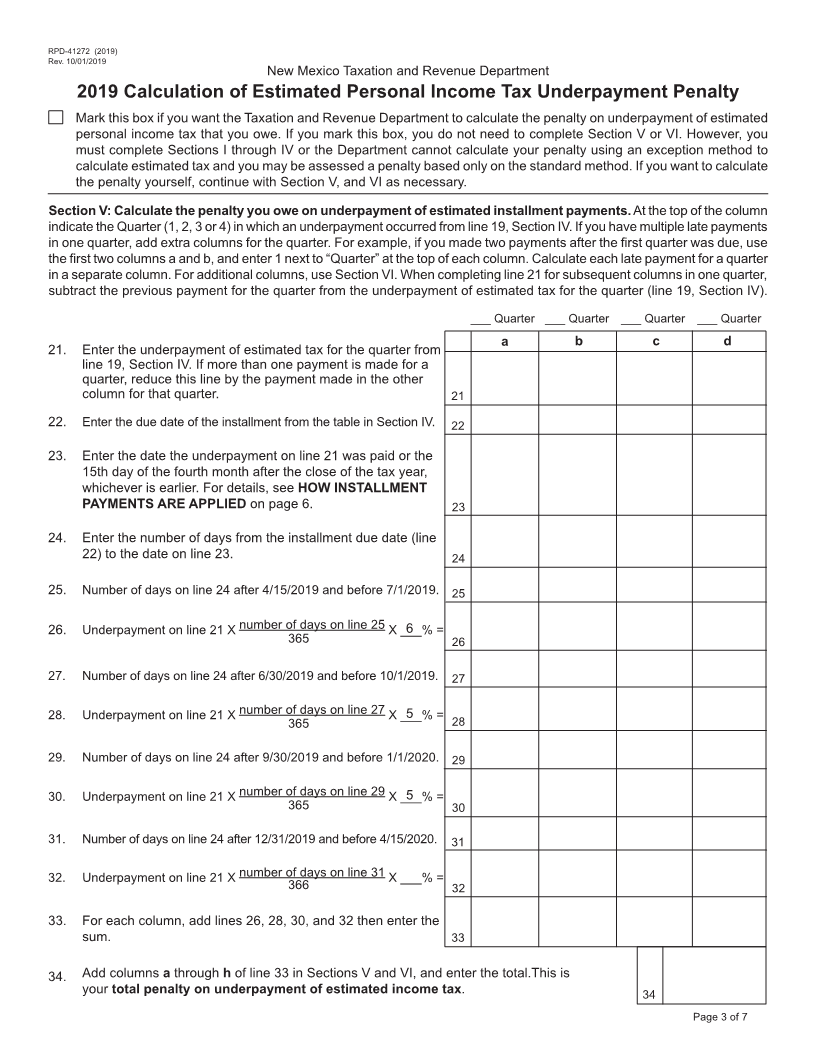
Enlarge image
RPD-41272 (2019)
Rev. 10/01/2019 New Mexico Taxation and Revenue Department
2019 Calculation of Estimated Personal Income Tax Underpayment Penalty
Print your name (first, middle, last) Enter your social security number
HOW TO USE THIS FORM
Complete and submit RPD-41272 only if you are using an exception method to calculate the penalty on underpay-
ment of estimated tax due. If you do not use an exception method, the Taxation and Revenue Department (TRD) calculates
your liability using only the standard method and, if you have a liability, sends you an assessment for penalty due. Exception
methods of calculating estimated tax penalties are described in Section III. To show you qualify for an exception method, you
must also mark the indicator box on New Mexico Personal Income Tax Form PIT-1, line 35. After completing RPD-41272,
attach it to your 2019 PIT-1. If you do not need to file RPD-41272, you may use it to calculate your penalty, but do not sub-
mit the form to the Department. For a complete explanation of calculating estimated personal income tax and how to make
estimated personal income tax payments, see also Publication FYI-320, PIT-ES: Personal Income Tax Estimated Payments.
NOTE: No penalty is imposed if, in Section II, the difference between line 4 in column 2 and the tax withheld and reported
on 2019 PIT-1 for the tax year is less than $1,000. In this case, you do not owe a penalty. Do not file this form.
Section I: Mark the box below that applies to you. Refer to Section III and the descriptions of exceptions on page 2 for
more details.
1. I may use an exception method to calculate estimated tax due because (checkone):
I want to calculate estimated payments based on the actual dates on which all amounts of withholding tax were
withheld for tax year 2019.
My income varied during the year and I was not required to pay estimated personal income tax until
after March 31, 2019(both must be true).
I am a farmer or rancher who expects to receive two-thirds of gross income for 2019 from ranching or
farming, or I have received at least two-thirds of my gross income for the previous tax year from farming
or ranching.
Section II: Calculate your required annual payment.
Enter the amounts from the New Mexico personal income tax forms and schedules for the tax year shown at the top of the
column. If you did not file a full, 12-month New Mexico PIT-1 return for tax year 2018, do not complete Column 1 (2018).
NOTE: If you are a first-year resident in 2019, you are not required to make Column 1 (2018) Column 2 (2019)
estimated payments.
2. In column 1 enter the amount of Net New Mexico Income Tax from 2018
PIT-1, line 22. In column 2 enter the amount from your 2019 PIT-1.
2
3. In column 1, enter the sum of rebates and all credits reported on 2018 PIT-1,
lines 24 and 25. In column 2, enter the sum from 2019 PIT-1, lines 24 and 25.
3
4. Subtract line 3 from line 2 and enter the difference. If the difference be-
tween the amount on this line in column 2 and the income tax withheld on
2019 PIT-1 is less than $1,000, stop here. You do not owe a penalty. Do
not file this form. See note under HOW TO USE THIS FORM at the top
of this page.
4
5. Multiply column 2, line 4 by 0.90 (90%) and enter here. 5
6. Enter the amount of column 1, line 4. If you did not complete column 1 or
if column 1, line 4 is a negative number, enter zero. 6
7. Enter the lesser of lines 5 and 6. This is your required annual payment. 7
Page 1 of 7





